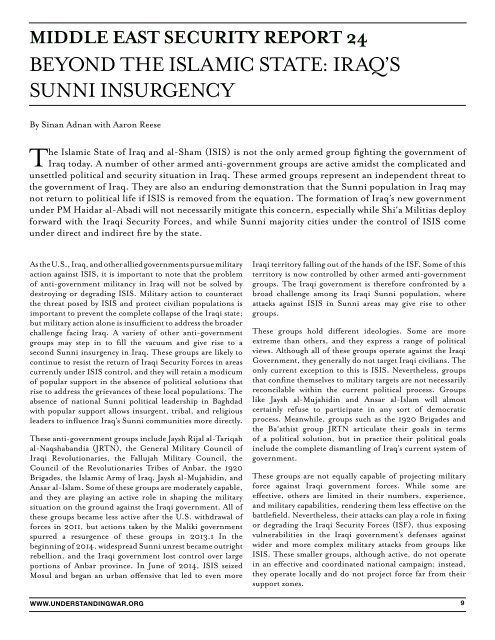Sunni Insurgency in Iraq_1
Sunni Insurgency in Iraq_1
Sunni Insurgency in Iraq_1
- No tags were found...
Create successful ePaper yourself
Turn your PDF publications into a flip-book with our unique Google optimized e-Paper software.
MIDDLE EAST SECURITY REPORT 24Beyond the Islamic State: <strong>Iraq</strong>’s<strong>Sunni</strong> <strong>Insurgency</strong>By S<strong>in</strong>an Adnan with Aaron ReeseThe Islamic State of <strong>Iraq</strong> and al-Sham (ISIS) is not the only armed group fight<strong>in</strong>g the government of<strong>Iraq</strong> today. A number of other armed anti-government groups are active amidst the complicated andunsettled political and security situation <strong>in</strong> <strong>Iraq</strong>. These armed groups represent an <strong>in</strong>dependent threat tothe government of <strong>Iraq</strong>. They are also an endur<strong>in</strong>g demonstration that the <strong>Sunni</strong> population <strong>in</strong> <strong>Iraq</strong> maynot return to political life if ISIS is removed from the equation. The formation of <strong>Iraq</strong>’s new governmentunder PM Haidar al-Abadi will not necessarily mitigate this concern, especially while Shi‘a Militias deployforward with the <strong>Iraq</strong>i Security Forces, and while <strong>Sunni</strong> majority cities under the control of ISIS comeunder direct and <strong>in</strong>direct fire by the state.As the U.S., <strong>Iraq</strong>, and other allied governments pursue militaryaction aga<strong>in</strong>st ISIS, it is important to note that the problemof anti-government militancy <strong>in</strong> <strong>Iraq</strong> will not be solved bydestroy<strong>in</strong>g or degrad<strong>in</strong>g ISIS. Military action to counteractthe threat posed by ISIS and protect civilian populations isimportant to prevent the complete collapse of the <strong>Iraq</strong>i state;but military action alone is <strong>in</strong>sufficient to address the broaderchallenge fac<strong>in</strong>g <strong>Iraq</strong>. A variety of other anti-governmentgroups may step <strong>in</strong> to fill the vacuum and give rise to asecond <strong>Sunni</strong> <strong>in</strong>surgency <strong>in</strong> <strong>Iraq</strong>. These groups are likely tocont<strong>in</strong>ue to resist the return of <strong>Iraq</strong>i Security Forces <strong>in</strong> areascurrently under ISIS control, and they will reta<strong>in</strong> a modicumof popular support <strong>in</strong> the absence of political solutions thatrise to address the grievances of these local populations. Theabsence of national <strong>Sunni</strong> political leadership <strong>in</strong> Baghdadwith popular support allows <strong>in</strong>surgent, tribal, and religiousleaders to <strong>in</strong>fluence <strong>Iraq</strong>’s <strong>Sunni</strong> communities more directly.These anti-government groups <strong>in</strong>clude Jaysh Rijal al-Tariqahal-Naqshabandia (JRTN), the General Military Council of<strong>Iraq</strong>i Revolutionaries, the Fallujah Military Council, theCouncil of the Revolutionaries Tribes of Anbar, the 1920Brigades, the Islamic Army of <strong>Iraq</strong>, Jaysh al-Mujahid<strong>in</strong>, andAnsar al-Islam. Some of these groups are moderately capable,and they are play<strong>in</strong>g an active role <strong>in</strong> shap<strong>in</strong>g the militarysituation on the ground aga<strong>in</strong>st the <strong>Iraq</strong>i government. All ofthese groups became less active after the U.S. withdrawal offorces <strong>in</strong> 2011, but actions taken by the Maliki governmentspurred a resurgence of these groups <strong>in</strong> 2013.1 In thebeg<strong>in</strong>n<strong>in</strong>g of 2014, widespread <strong>Sunni</strong> unrest became outrightrebellion, and the <strong>Iraq</strong>i government lost control over largeportions of Anbar prov<strong>in</strong>ce. In June of 2014, ISIS seizedMosul and began an urban offensive that led to even morewww.Understand<strong>in</strong>gwar.org<strong>Iraq</strong>i territory fall<strong>in</strong>g out of the hands of the ISF. Some of thisterritory is now controlled by other armed anti-governmentgroups. The <strong>Iraq</strong>i government is therefore confronted by abroad challenge among its <strong>Iraq</strong>i <strong>Sunni</strong> population, whereattacks aga<strong>in</strong>st ISIS <strong>in</strong> <strong>Sunni</strong> areas may give rise to othergroups.These groups hold different ideologies. Some are moreextreme than others, and they express a range of politicalviews. Although all of these groups operate aga<strong>in</strong>st the <strong>Iraq</strong>iGovernment, they generally do not target <strong>Iraq</strong>i civilians. Theonly current exception to this is ISIS. Nevertheless, groupsthat conf<strong>in</strong>e themselves to military targets are not necessarilyreconcilable with<strong>in</strong> the current political process. Groupslike Jaysh al-Mujahid<strong>in</strong> and Ansar al-Islam will almostcerta<strong>in</strong>ly refuse to participate <strong>in</strong> any sort of democraticprocess. Meanwhile, groups such as the 1920 Brigades andthe Ba‘athist group JRTN articulate their goals <strong>in</strong> termsof a political solution, but <strong>in</strong> practice their political goals<strong>in</strong>clude the complete dismantl<strong>in</strong>g of <strong>Iraq</strong>’s current system ofgovernment.These groups are not equally capable of project<strong>in</strong>g militaryforce aga<strong>in</strong>st <strong>Iraq</strong>i government forces. While some areeffective, others are limited <strong>in</strong> their numbers, experience,and military capabilities, render<strong>in</strong>g them less effective on thebattlefield. Nevertheless, their attacks can play a role <strong>in</strong> fix<strong>in</strong>gor degrad<strong>in</strong>g the <strong>Iraq</strong>i Security Forces (ISF), thus expos<strong>in</strong>gvulnerabilities <strong>in</strong> the <strong>Iraq</strong>i government’s defenses aga<strong>in</strong>stwider and more complex military attacks from groups likeISIS. These smaller groups, although active, do not operate<strong>in</strong> an effective and coord<strong>in</strong>ated national campaign; <strong>in</strong>stead,they operate locally and do not project force far from theirsupport zones.9


